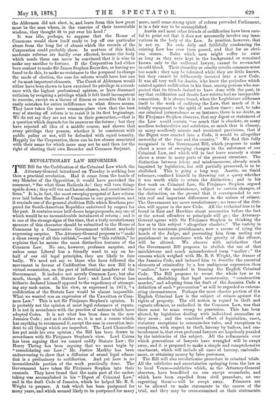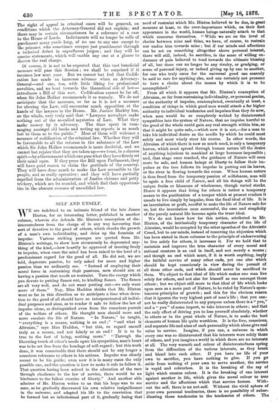REVOLUTIONARY LAW REFORMERS. T HE Bill for the Codification of the
Criminal Law which the Attorney-General introduced on Tuesday is nothing less than a practical revolution. Had it come from the hands of any Member of the Opposition, it would have provoked the comment, "See what these Radicals do ! they will turn things upside down ; they will vex and harass classes, and recast institu- tions." It is, in fact, the most sweeping propersal of Law reform ever laid before the House of Commons in our generation, and it reminds one of the general abolition Bills which Bentham pre- pared for South-American Republics unfettered by respect for the past. It contains some half-dozen large proposals, any one of which would be no inconsiderable instalment of reform ; and it is one of the strange signs of the time, that a truly revolutionary measure of this character should be submitted to the House of Commons by a Conservative Government without anybody expressing surprise. The Attorney-General proposes to "make a clean sweep of all this rubbish,"—and by "this rubbish," he explains that he means the most distinctive features of the Common Law. No one, however, professes surprise, and unless some Liberal has a friendly word to say on be- half of our old legal principles, they are likely to fare badly. We need not say to those who have followed the movement in favour of Codification that the new Bill is a virtual recantation, on the part of influential members of the Government. It includes not merely Common Law, but also much, though not all, Statute Law ; and Lord Cairns has hitherto declared himself opposed to the expediency of attempt- ing any such union. In his view, as expressed in 1874, "a codification of the Statute Law would be almost impossible. What we wanted was an expression of the Unwritten or Com- mon Law." This is not Sir Fitzjames Stephen's opinion. It is probably not the opinion of most legal reformers of repute. It is not in accordance with the practice of nations which have adopted Codes. It is not what has been done in the new Jamaica Code ; and as it strikes us, it is not a course which has anything to recommend it, except the ease in execution inci- dent to all things which are imperfect. The Lord Chancellor has put aside his own opinion ; the Bill has been drawn in accordance with Sir Fitzjames Stephen's view. Lord Cairns has been arguing that we cannot codify Statute Law ; Sir Henry Thring has been arguing that we must begin by "consolidating our Law ;" Mr. Justice Markby has been endeavouring to show that a diffusion of sound legal educa- tion is a preliminary to codification. And yet here is no inconsiderable portion of the work practically done. The Government have taken Sir Fitzjames Stephen into their counsels. They have found that the main part of the under- taking was accomplished in his "Digest of Criminal Law," and in the draft Code of Jamaica, which he helped Mr. R. S. Wright to prepare. A task which has been postponed for many years, and which seemed likely to be postponed for many more, until some strong spirit of reform pervaded Parliament, is in a fair way to be accomplished. Austin and most other friends of codification have been care- ful to point out that it does not necessarily involve any inno- vations in the body of the Law. In practice, however, that is not so. No code drily and faithfully condensing the existing Law has ever been passed, and that for an obvi- ous reason. Rules which men might suffer to exist so long as they were kept in the background or remained known only to the well-read lawyer, cannot be re-enacted in cold blood. Their absurdity or cruelty revolts common-sense too much ; they may be tolerated while they are little known, but they cannot be deliberately inserted into a new Code. It was all very well for Austin, who knew the prejudice which existed against codification in his time, among persons who sus- pected that its friends desired to have done with the past, to say that codification and drastic Law reform had no inseparable connection. It is always found, when the Legislature addresses itself to the work of codifying the Law, that much of it is totally repugnant to the spirit of modern times ; and, to take our criminal jurisprudence as an instance, there is no doubt, as Sir Fitzjames Stephen observes, that any digest or statement of the Law would contain "so much that is obsolete, so many needless technicalities and subtleties, so much that is clumsy, so many needlessly minute and irrational provisions, that if the Digest were enacted into a Code, it would be altogether unworthy of the time and the country." We find this fully recognised in the Government Bill, which proposes to make about a score of sweeping changes in the substance of our Criminal Law, and which will in fact leave scarcely a stone above a stone in many parts of the present structure. The distinction between felony and misdemeanour, already much impaired by legislation, but still partially preserved, is to be abolished. This is going a long way. Austin, no timid reformer, confined himself to throwing out a query whether it was worth while to retain the distinction ; and in his first work on Criminal Law, Sir Fitzjames Stephen argued in favour of the maintenance, subject to certain changes, of the distinction, on the ground that it corresponded to cer- tain real and important differences in the nature of crimes. The Government are more revolutionary ; no trace of the divi- sion will appear in the new Code. All the technical lore to be found in East and Hawkins about accessories before the fact or the actual offenders or principals will go ; the Attorney General agrees with Sir Fitzjames Stephen in thinking the law as to this subject "altogether obsolete." The variety in regard to maximum punishments, now a means of tying the hands of the Judge, and preventing him from meting out punishment in accordance with the gravity of the offence, will be altered. We observe with satisfaction that the Government Bill proposes to abolish the use of that mischievous and much misunderstood term " malice ; " the reasons which weighed with Mr. R. S. Wright, the framer of the Jamaica Code, and induced him to describe the essential elements of criminality by a less ambiguous expression than "malice," have operated in framing the English Criminal Code. The Bill proposes to recast the whole law as to murder, abolishing that legal monstrosity, "constructive murder," and adopting from the draft of the Jamaica Code a definition of such " provocation " as will be regarded as extenu- ating circumstances. Perhaps the most chaotic portion of the English Criminal Law is the subject of crimes against the rights of property. The old notion in regard to theft and cognate offences, as embodied in the Common Law, was that there must be some wrong to possession. This has been altered, by legislation dealing with individual anomalies as they arose ; and the combined effect of legislation, cases, statutory exceptions to common-law rules, and exceptions to exceptions, with respect to theft, larceny by bailees, and em- bezzlement is, that even profound lawyers are hopelessly puzzled by the intricacies of the subject. All the refinements over which generations of lawyers have wrangled will be swept away, and it is proposed to make a simple and comprehensive enactment, which will include all cases of larceny, embezile- ment, or obtaining money by false pretences.
The Bill will also revolutionise procedure in criminal trials. All the subtleties and uncertainties springing from the law as to local Venue—subtleties which, as the Attorney-General observes, have benefitted no one except scoundrels, and which have been expelled from civil procedure, no one regretting them—will be swept away. Prisoners are to be allowed to make statements in the course of the trial, and they may be cross-examined on their statements. The right of appeal in criminal cases will be granted, on conditions which the Attorney-General did not explain; and there may in certain circumstances be a reference of a case to the House of Lords. Indictments will no longer be rolls of parchment many yards long, of no use to any one except to the prisoner, who sometimes escapes just punishment through a technical defect in superfluous jargon ; and they will be concise statements, which will enable any one at a glance to discern the real charge.
Of course, it is not to be expected that this vast beneficial measure will pass this Session ; we shall be surprised if it becomes law next year. But we cannot but feel that Codifi- cation has made an immense advance when an Attorney- General—and one, too, with little liking for professional novelties, and no bent towards the theoretical side of law— introduces a Bill of this sort. Codification cannot be far off, when Sir John biker recommends it so warmly. We do not anticipate that the measure, so far as it is not a measure for altering the Law, will encounter much opposition at the handa of the lawyers in the House. Mr. Justice Markby has, on the whole, very truly said that "Lawyers nowadays make nothing out of the so-called mysteries of Law. What they make money by is advocacy. The time spent in rum- maging amongst old books and noting up reports is as much lost to them as to the public." Most of them will welcome a measure of codification of the criminal law. Whether they will be favourable to all the reforms in the substance of the Law which Sir John Holker recommends is more doubtful, and we cannot but rejoice that they are taken up—we trust, in a sincere spirit—by a Government which can pass what they have firmly set their mind upon. If they press the Bill upon Parliament, they will have good reason to claim the gratitude of the country. They will have done much to make the Law accessible to the people, and so really operative ; and they will have partially expelled from the administration of Justice chicane and petty trickery, which are its scandal, and which find their opportuni- ties in the obscure recesses of uncodified law.



































 Previous page
Previous page